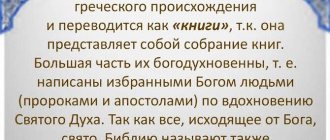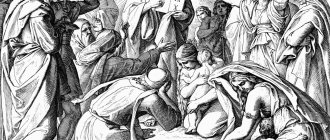What is the Bible
The Bible is a collection of writings compiled by different authors. The Holy Scriptures are written in different literary styles, and interpretation comes from these styles. The purpose of the Bible is to bring the words of the Lord to people.
The main topics are:
- creation of the world and man;
- the fall and expulsion of people from paradise;
- life and faith of the ancient Jewish peoples;
- the coming of the Messiah to earth;
- life and suffering of the Son of God Jesus Christ.
Four Gospels about the Character of Jesus
The Gospels of Matthew and John speak of the greatness of Jesus Christ as the King and Son of God.
The Gospels of Mark and Luke speak of His humility. In these Gospels you see a servant and a man.
- 500 shekels of myrrh (Gospel of Matthew).
- 250 shekels His humility (Gospel of Mark)
- 250 shekels (Gospel of Luke)
- 500 shekels (Gospel of John).
The 5th ingredient, olive oil, is the book of the Acts of the Holy Spirit, a record of His activities.
Do you want to touch the anointing?
Read the Gospels and read the book of Acts.
Jesus bowed his head
When Jesus tasted the sour wine, he said one word: “It is finished!” and bowed his head. He bowed his head and passed on the Spirit. This does not mean that Jesus died helplessly because of pain or wounds, although He was in pain. He died while giving His Spirit to the Father.
Bowing your head is an indicator of strength, it is a gesture of worship.
What language is the Bible written in?
The first chapters were written in the language of the ancient Jews - Hebrew. The texts compiled during the life of Jesus Christ were written in Aramaic.
For the next few centuries, the Word of God was written in Greek. Seventy interpreters were involved in the translation into Greek from Aramaic. Servants of the Orthodox Church use texts translated by interpreters.
The first Slavic Holy Scripture was translated from Greek and is the first book to appear in Rus'. The translation of the sacred meetings was entrusted to the brothers Cyril and Methodius.
During the reign of Alexander I, biblical texts were translated from Slavic into Russian. Then the Synodal translation appeared, which is also popular in the modern Russian Church.
How to read the Bible correctly - where to start?
The Orthodox Holy Scripture consists of many books, each containing invaluable information that helps believers get to know God better and let him into their lives. How to read the Bible, where to start, you need to figure out for a correct understanding of what is written. Before you pick up the Bible for the first time, you must seek the blessing of a priest by listening to his advice. Before reading the Holy Book, you should definitely pray. The main guidelines for studying the Bible are:
- Many confessors recommend starting reading with the Gospel of Mark; this is one of the most understandable, written in simple language, exposition of the life of Jesus Christ.
- The next book you can read is the Gospel of Luke.
- After this, it is worth continuing to study the text recorded by Luke, which is contained in another book - the Acts of the Apostles.
- It is recommended that you read the Gospel of John next and understand the main idea of this book - the meaning of the existence of Jesus Christ.
- The Gospel of Matthew can bring a deeper understanding of God's central commandments.
- The letters to the churches written by the major apostles are surprising in their relevance, even though they were written many thousands of years ago.
- The remaining books should be studied last; the book “Apocalypse” contains text that is difficult to understand without prior preparation.
Why is this the Holy Book of Christians
The Bible is not just a holy book. This is a handwritten source of human spirituality. From the pages of Scripture people draw wisdom sent by God. The Word of God is a guide for Christians in their worldly life.
Through Biblical texts the Lord communicates with people.
Helps you find answers to the most difficult questions. The books of the Holy Scriptures reveal the meaning of existence, the secrets of the origin of the world and the definition of man's place in this world.
By reading the Word of God, a person comes to know himself and his actions. Becomes closer to God.
Who wrote the Bible?
The Bible is not an ordinary book, it is Scripture with important meaning. When understanding the question of what the Bible is, it is worth remembering the people who wrote down the text of the Holy Book. The Bible itself says that it was created “by inspiration”; the prophets were guided by the Lord himself. The number of its authors exceeds 40 people. Over time, the people who recorded the text changed, and along with them, the languages, so there is no clear answer to the question in what language the Bible was written. The Bible has been translated into many languages, but the Scripture was originally stated as follows:
- Hebrew is the language in which the Old Testament was written.
- Greek is the language in which the New Testament was written.
Gospel and Bible - what's the difference
The Holy Scriptures are a collection of books divided into the Old and New Testaments. The Old Testament describes the time from the creation of the world until the coming of Jesus Christ.
The Gospel is the part that makes up the Bible texts.
Included in the New Testament portion of Scripture. In the Gospel, the description begins from the birth of the Savior to the Revelation, which he gave to His Apostles.
The Gospel consists of several works written by different authors and tells the story of the life of Jesus Christ and His deeds.
How is Holy Scripture organized?
Photo: Flickr.com
The Bible consists of the books of the Old and New Testaments.
There are about fifty writings included in the Old Testament. In Orthodoxy, only 38 of them are recognized as canonical.
The New Testament includes 27 books, including four Gospels. In addition, the constituent parts of the New Testament are the Acts of the Apostles and the 21 Apostolic Epistles.
The basis of the Gospel is made up of four texts recognized as canonical. This is the Gospel of Matthew, Luke, Mark and John. The latter was created much later, therefore it differs significantly in the text and the events described in it. However, the Gospel of John is believed to be based on an older text, so it is also recognized as canonical.
What parts does the Bible consist of?
Biblical texts are divided into canonical and non-canonical parts. Non-canonical ones include those that appeared after the creation of the New Testament.
The structure of the canonical part of Scripture includes:
- legislative: Genesis, Exodus, Deuteronomy, Numbers and Leviticus;
- historical content: those that describe the events of holy history;
- poetic content: Psalms, Proverbs, Song of Songs, Ecclesiastes, Job;
- prophetic: writings of great and minor prophets.
Non-canonical texts are also divided into prophetic, historical, poetic and legislative.
Orthodox Bible in Russian - text of the Old and New Testaments
Reading Biblical texts begins with the desire to know God's Word. The clergy advise the laity to begin reading from the pages of the New Testament. After reading the New Testament books, a person will be able to understand the essence of the events described in the Old Testament.
To understand the meaning of what is written, you need to have at hand works that provide a decoding of the Holy Scriptures. An experienced priest or confessor can answer any questions you may have.
The Word of God can provide answers to many questions. Studying Bible texts is an important part of the life of every Christian. Through them, people come to know the grace of the Lord, become better people and move spiritually closer to God.
→ The essence of the Bible, its composition and structure
General characteristics of the Bible
In this article we will briefly look at the essence of the Bible, as well as the composition and structure of the Bible.
The word "bible" comes from Greek and means "books." Apparently, it is no coincidence that the book, which is undoubtedly one of the highest values acquired by humanity, is so simply named. For at least three thousand years, the word “bible” has inspired people, and the circle of those who connect with this source is constantly expanding.
However, there were other times. The Bible was actually banned by the Soviet government, it was not printed and was withdrawn from circulation and libraries, its images and words were carefully crossed out or lost hints of their source, or were simply ridiculed.
Therefore, in our historically Christian country, several generations of people have grown up who do not know the Bible at all or almost not, and have not read it. It should be noted that this is not only religious, but also cultural ignorance, since European culture, especially the culture of the Middle Ages, Renaissance, Modern times, as well as modern culture, cannot be comprehended without knowledge of biblical characters, images, and events. The Bible can be viewed from at least three perspectives:
- The first
- and most important - is that this is
the Holy Scripture
of the Christian religion. This statement, however, requires some clarification. On the one hand, a significant part of the Bible - the Old Testament - was written in pre-Christian times and is the property of the Jewish tradition. The Holy Scripture of the Jews - the Torah - is actually an integral part of the Bible. And Islam, which arose later than Christianity, widely uses biblical images as one of the sources of the Koran. On the other hand, some denominations of Christianity have different attitudes towards certain parts of the Bible, either excluding the so-called non-canonical books, or preferring the New Testament as a purely Christian revelation. But despite this, it is precisely as Holy Scripture that the Bible has its exclusive meaning, and it is from this point of view that it should be approached in the first place.
- Secondly
, the Bible can be perceived as
a historical source
. It, indeed, contains evidence concerning the history of many peoples of the Ancient East from the 2nd millennium BC. before the beginning of a new era. Of course, using the Bible as a historical source requires scientific analysis and verification from other sources, but this should not be perceived as criticism and rejection of Holy history.
- Third
, ‒ The Bible can be considered an important
literary or cultural monument
. Many biblical texts can be noted for their literary excellence - not to mention the fact that this book has the value of any written monument of antiquity. By the way, in terms of the number of editions and translations into different languages, the Bible far exceeds any other works. But, again, this is a consequence of its influence not as a masterpiece of art, but as a Holy phenomenon.
Composition and structure of the Bible
The Bible is a fairly large book that has a complex structure and contains many relatively independent books. The main thing is its division into two components - the Old and New Testaments.
- The Old Testament
is a pre-Christian, Jewish Bible (in fact, Jews do not perceive the Bible as a whole - the New Testament, naturally, is not recognized at all, and only
the Torah - the Pentateuch of Moses
) is considered Holy Scripture. It was accepted by the Christian Church as an integral part of the Holy Scriptures, and Christianity grew to a large extent on Jewish soil; these books were recognized by Christ and used by him as the Word of God; after all, these books contain many prophecies about the appearance of Christ himself and his mission.
- The second part - the New Testament
- is already its own Christian tradition, these are texts related to the life and work of Jesus Christ and his disciples.
There are discrepancies in different translations and editions of the Bible regarding the names of the books and the order in which they are placed. Moreover, there is disagreement about the number of books that make up the Bible. This applies only to the Old Testament and is connected with two circumstances: with the counting system and with the division into the so-called canonical and non-canonical books.
Thus, the Jewish tradition, which some Christian theologians adhered to, numbered 24 or even 22 books, which in modern Christian publications, as a rule, are divided into 39 books (due to the fact that they are presented as two instead of one book of Samuel, Kings, Chronicles, as well as 12 books of minor prophets instead of one, etc.). Another was the grouping of books according to their content in the Hebrew Bible (TaNaKha)
, which consists of
the Torah (Law), Neviim (Prophets) and Ketuvim (Scriptures)
.
The Christian tradition identifies the following sections of the canon (the canonical composition of the Bible):
- books of law:
the Pentateuch of Moses, that is, Genesis, Exodus, Leviticus, Numbers, Deuteronomy;
- historical books
, that is, those that set out primarily Holy history: Joshua, Judges, Ruth, I and II books of Samuel (in Russian translation - 1 and 2 books of Kings), I and II books of Kings (3 and 4 books of Kings, respectively) , 1 and 2 books of Chronicles (or Chronicles), Ezra, Nehemiah, Esther; - educational poetry books
: Job, Psalms, Proverbs (Proverbs of Solomon), Preacher (Ecclesiastes), Song of Songs; - prophetic books
: great prophets - Isaiah, Jeremiah, Lamentations, Ezekiel, and small ones - Daniel, Hosea, Joel, Amos, Obadiah, Jonah, Micah, Nahum, Habakkuk, Zephaniah, Haggai, Zechariah, Malachi.
Regarding non-canonical books
, then they appeared later than other books of the Old Testament and were not included in the Jewish canon or were excluded from it. Christian tradition accepted them, but with some prejudices. They were advised to be read by those who were preparing to join the Christian church, since they are distinguished by their instructive character (however, among them we also find historical and prophetic books).
The Catholic Church considers such books to be deuterocanonical (deuterocanonical), Orthodoxy continues to consider them non-canonical, but the Slavic and Russian Orthodox Bibles print them next to the canonical ones. Protestants, on the contrary, do not print these books in the texts of the Bible, not considering them divinely inspired.
There are 11 of these books:
Wisdom (Wisdom of Solomon), Sirach (Wisdom of Jesus son of Sirach), Tobit, Judit, Epistle of Jeremiah, Baruch, 2 and 3 books of Ezra (Catholics consider them apocryphal), three books of Maccabees (Catholics have only two).
This also includes passages that are added to some canonical books (for example, chapters 13 and 14 of the book of Daniel). The New Testament
contains
27 books
, which church tradition also divides into groups:
The four
Gospels
(from Greek - Good News) - from Matthew (Matthew), from Mark, from Luke, from John (John) to the legislative ones The first three Gospels, which are similar in content, are called synoptic; The Gospel of John is very different from them both in content and in character.-
of the Acts of the Apostles
is considered historical . - The educational books
consist of 14 epistles of the Apostle Paul and 7 epistles of other apostles. - Finally, the prophetic book
of the New Testament is
the Revelation of John the Theologian (Apocalypse)
.
Thus, the composition of the canonical Bible
, that is, the Holy Scriptures of the Old and New Testaments, includes
66 books
(39 + 27) - this composition is recognized by Protestants;
and the complete Bible consists
of
77 books
(50 + 27) for the Orthodox and 74 (47 + 27) for the Catholics, divided into canonical and not canonical (deuterocanonical) books.
References:
1. Religion: a handbook for students of advanced knowledge / [G. E. Alyaev, O. V. Gorban, V. M. Meshkov et al.; for zag. ed. prof. G. E. Alyaeva]. - Poltava: TOV "ASMI", 2012. - 228 p.
The Christian faith is built on the Bible, but many do not know who its author is or when it was published. To get answers to these questions, scientists have conducted a large number of studies. The dissemination of Holy Scripture in our century has reached enormous proportions; it is known that every second one book is printed in the world.
What does the Bible consist of?
The book is striking in its unity of content from the first to the last page. Some texts are confirmed by others, this is the unique feature of the Bible. The Holy Book of the entire Orthodox world has a complex structure and consists of a large number of parts that carry a separate meaning. Answering the question of how many books are in the Bible, an Orthodox priest will confidently answer - the Old and New Testaments consist of 77 books. Experts are still arguing about the order of placement of individual sections in the Bible; the Christian version identifies several sections of the Holy Scriptures:
- Legislative books.
- Educational poetry books.
- Prophetic books.
Bible - Old Testament
The peculiarities of the structure of the Holy Scriptures are interesting for many believers; what the Orthodox Bible consists of is necessary for a Christian who worships God to understand. The Old Testament is the first part of the Bible, it was born in pre-Christian times, and was written in Hebrew. The Old Testament is believed to contain basic rules that must be followed by all Jews and Christians. These commandments were written down by Moses on the sacred Mount Sin.
Bible - New Testament
The New Testament is the second part of the Bible. 27 books describe the life and feat of Jesus Christ in the name of the salvation of all mankind, numerous facts confirming the appearance of God, a description of the crucifixion of Jesus, the magical resurrection, all this and much more - what is said in the Bible. There are several types of books in the New Testament:
- Historical
- this is the Gospel, consisting of four parts, from Matthew, Mark, Luke and John, this also includes the book of the Acts of the Apostles. - Educational
- epistles of the apostles, presented in the form of letters containing appeals to different churches. - Prophetic
is the Apocalypse. John the Theologian. This book contains a prediction of what awaits humanity before the second coming of Jesus.
What is the Bible?
Christians call the collection of books that make up the Holy Scriptures the Bible. It is considered the word of the Lord that was given to people. Much research has been done over the years to understand who wrote the Bible and when, so it is believed that the revelation was given to different people and the recordings were made over many centuries. The Church recognizes the collection of books as inspired by God.
The Orthodox Bible in one volume contains 77 books with two or more pages. It is considered a kind of library of ancient religious, philosophical, historical and literary monuments. The Bible consists of two parts: the Old (50 books) and the New (27 books) Testament. There is also a conditional division of the Old Testament books into legal, historical and teaching.
Why was the Bible called the Bible?
There is one main theory proposed by biblical scholars that answers this question. The main reason for the appearance of the name “Bible” is associated with the port city of Byblos, which was located on the Mediterranean coast. Through him, Egyptian papyrus was supplied to Greece. After some time, this name in Greek began to mean a book. As a result, the book the Bible appeared and this name is used only for the Holy Scriptures, which is why the name is written with a capital letter.
The Bible - what is it?
In the home of many Orthodox people, a special place is occupied by the Bible, the Holy Scriptures - several books that were created by chosen people - prophets and apostles, under the guidance of the Holy Spirit. The word “bible” itself has Greek roots, and when translated means “book”. Most Orthodox people know what is written in the Bible - it tells about the life of Jesus, the son of a simple girl Mary, who became the savior of all mankind. Sections of the Bible are more than 1.5 thousand years old, but the topics that Scripture covers are still relevant.
Gospel and Bible - what's the difference?
The Gospel is translated as “good news,” which is the name given to the first four books of the New Testament section of the Bible. They tell about how Jesus Christ, the son of God, lived and studied, how he was crucified and resurrected. It is impossible to talk about how the Bible and the Gospel differ, since the second is an integral part of the first, and it is wrong to separate these two books. The four parts that make up the Gospel are named after the prophets who wrote them: Mark, Matthew, Luke and John. The last part was written much later than the others.
How is the Koran different from the Bible?
The Koran is the most important book among Muslims; it gets its name from the Arabic expressions “edification” and “reading aloud.” Some researchers still argue which came first - the Koran or the Bible. The books that make up the text of the Bible were created over a long period of time, so the general text of the Holy Scriptures was canonized approximately 1600 years ago. The Quran was introduced by the prophet Muhammad 1300 years ago. The Bible was copied many times as the sacred scrolls quickly wore out, while the Koran appeared at a time when book culture was already developed.
The Bible and the Gospel - what's the difference?
Many believers do not have an accurate understanding of the main Holy Book for Christians.
- The gospel is part of the Bible, which is included in the New Testament.
- The Bible is an early scripture, but the text of the Gospel was written much later.
- The text of the Gospel tells only about life on earth and the ascension to heaven of Jesus Christ. There is much more information provided in the Bible.
- There are also differences in who wrote the Bible and the Gospel, since the authors of the main Holy book are unknown, but regarding the second work there is an assumption that its text was written by four evangelists: Matthew, John, Luke and Mark.
- It is worth noting that the Gospel is written only in ancient Greek, and the texts of the Bible are presented in different languages.
When were the Bible and Gospel created?
Photo: Hram-orbita.cerkov.ru
Currently, it is problematic to even determine the century when this or that sacred text was written. The first texts of the Gospel were created in the 2nd-3rd centuries AD. e. According to some studies, the authors who created them lived in the 1st century. n. e., so the texts may be older than officially believed.
With the Bible there is a little more certainty. The Old Testament is believed to have been written from 1513 BC to 443 BC. The New Testament was written from 41 to 98 AD.
Who is the author of the Bible?
For believers, the author of the Holy Book is the Lord, but experts can challenge this opinion, since it contains the Wisdom of Solomon, the book of Job and more. In this case, answering the question of who wrote the Bible, we can assume that there were many authors, and everyone made their own contribution to this work. There is an assumption that it was written by ordinary people who received divine inspiration, that is, they were only an instrument, holding a pencil over the book, and the Lord led their hands. When figuring out where the Bible came from, it is worth pointing out that the names of the people who wrote the text are unknown.
When was the Bible written?
There has been debate for a long time regarding when the most popular book in the whole world was written. Among the well-known statements with which many researchers agree are the following:
- Many historians, answering the question regarding when the Bible appeared, point to the 8th-6th centuries BC. e.
- A huge number of biblical scholars are confident that the book was finally formed in the V-II centuries BC. e.
- Another common version of how old the Bible is indicates that the book was compiled and presented to believers around the 2nd-1st century BC. e.
The Bible describes many events, thanks to which we can come to the conclusion that the first books were written during the lives of Moses and Joshua. Then other editions and additions appeared, which shaped the Bible as it is known today. There are also critics who dispute the chronology of the writing of the book, believing that the presented text cannot be trusted, since it claims to be of divine origin.
What language is the Bible written in?
The majestic book of all times was written in ancient times and today it has been translated into more than 2.5 thousand languages. The number of Bible editions exceeded 5 million copies. It is worth noting that the current editions are later translations from the original languages. The history of the Bible indicates that it was written over many decades, so it contains texts in different languages. The Old Testament is largely presented in Hebrew, but there are also texts in Aramaic. The New Testament is presented almost entirely in ancient Greek.
Given the popularity of Holy Scripture, it will not surprise anyone that research was carried out and this revealed a lot of interesting information:
- Jesus is mentioned most often in the Bible, with David in second place. Among women, Abraham's wife Sarah receives the laurels.
- The smallest copy of the book was printed at the end of the 19th century using the photomechanical reduction method. The size was 1.9x1.6 cm, and the thickness was 1 cm. To make the text readable, a magnifying glass was inserted into the cover.
- Facts about the Bible indicate that it contains approximately 3.5 million letters.
- To read the Old Testament you need to spend 38 hours, and the New Testament will take 11 hours.
- Many will be surprised by this fact, but according to statistics, the Bible is stolen more often than other books.
- Most copies of the Holy Scriptures were made for export to China. Moreover, in North Korea, reading this book is punishable by death.
- The Christian Bible is the most persecuted book. In all of history, there is no other work known against which laws were passed, for violation of which the death penalty was imposed.
Basic parts of the Bible.
The Bible is the holy book of two religions - Judaism and Christianity. This word itself is taken from the ancient Greek language and means “books” (in ancient times, a book was called a papyrus scroll on which a text was placed, approximately equal in volume to a modern book chapter). If we open the modern edition of the Bible, we will see that this thick volume contains several dozen different works, each of which has its own name.
The Bible consists of two parts: the first of which is called the Old Testament, the second - the New Testament. The word “covenant” here means “union” - we are talking about friendship and alliance, which in ancient times God concluded with one of the peoples - the ancient Jews. The Old Testament, that is, the “old union,” Christians called that part of the Bible that describes the events before the coming of Jesus Christ to the people, when the union with God was concluded again. Therefore, the second part of the Bible, which tells about Christ, is called the New Testament.
The Jews recognize the sacred character only of the Old Testament, since they do not consider the New Testament Jesus of Nazareth to be the true Christ, i.e. Messiah, Savior. Of course, they do not use the very name “Old Testament”; for them, God made a covenant with his chosen people once and for all. Therefore, they simply call “their” part of the Bible Scripture. Christians, since their religion arose on the basis of the Hebrew, now called Judaism, consider both parts of the Bible sacred.
What does the Old Testament talk about?
The Old Testament tells how God once created heaven and earth, plants and animals, and, finally, people. Then the Bible talks about various events in the life of the ancient Jews: how their ancestors lived in the steppes and deserts, engaged in cattle breeding, how they fell into slavery and were freed from it, how they entered into an alliance with God and He promised to forever give them the land, so rich that milk and honey flowed in the rivers instead of water.
In a bloody and merciless struggle with the peoples who lived on this land, the ancient Jews created their own state. Centuries passed, the kingdom of the Jews was destroyed by stronger neighbors, and they themselves were taken into captivity. All this happened, as the Bible says, due to the fact that the Jews stopped obeying God, betrayed him and worshiped foreign gods.
However, God, who punished them, promised that over time he would send his messenger to earth who would save the Jewish people and punish their oppressors. In ancient Hebrew, this messenger of God is called the Messiah, and translated into ancient Greek - Christ.
What does the New Testament talk about?
The New Testament, created by Christians, tells about the earthly life of Jesus of Nazareth, who is Christ. In addition, this part of the Bible talks about the activities of the communities of the first Christians and contains the messages of the apostles, disciples of Jesus. The New Testament ends with the Revelation of John, which depicts the coming end of the world.
Bible and myths.
Thus, the Bible is a collection of a wide variety of texts that contain myths, legends, narrations of real historical events, some kind of predictions of the future, lyrical works of a religious and secular nature.
The Old Testament is distinguished by the greatest wealth of mythological subjects. Some of them are given and analyzed below. Since the Bible played a special role in the formation of world civilization, biblical myths, like ancient ones, entered the treasury of universal human culture to a greater extent than, say, Chinese, Japanese or Australian ones. Therefore, many mythological or legendary stories in the Bible need commentary for the modern reader. If it is necessary to clarify or supplement a biblical story, commentary on it is usually given in italics and enclosed in square brackets.
The word "Bible" means "book", but the Bible is not an ordinary book. This is the Book of Books because in it, and only in it, we find the will of God revealed to humanity.
Part 1. Gospels
Faith:
“God so loved the world that he gave his only begotten Son, that whoever believes in him should not perish but have eternal life” (John 3:14-21); “If you can believe as long as you can, all things are possible to him who believes” (Mark 9:23); “Blessed are those who have not seen and yet have believed” (John 20:29. See also Matt. 16:17–18; Luke 17:5–10; Mark 16:16).
God's will, follow it
: “Thy will be done on earth as it is in heaven” (Matthew 6:10); “Not everyone who says to Me: Lord! God! He who does the will of My Father in heaven will enter the kingdom of heaven” (Matthew 7:2–27).
Gratitude to God
: “Were not ten cleansed, where are nine? How did they not return to give glory to God, except for this foreigner... Arise, go: your faith has saved you!” (story of the ten lepers, Luke 17:11–19).
Grace, Holy Spirit
: “That which is born of the Spirit is spirit” (John 3:6); “Whoever drinks of the water that I give him will never thirst, but the water that I give him will become in him a fountain of water springing up into eternal life” (John 4:13-14); “If you, being evil, know how to give good gifts to your children, how much more will the Heavenly Father give the Holy Spirit to those who ask him” (Luke 11:13); “The Comforter, the Spirit of Truth... He will guide you into all truth” (John 16:13). (See also John 7:37-39, John 14:5-21, John 16:13; Mark 4:26-29, the parable of the invisibly growing seed; Matthew 13:31-32, the parable of the mustard seed; Matthew 25: 1–13, parable of the ten virgins).
Wakefulness
: “Keep awake, because you do not know when the owner of the house will come, in the evening, or at midnight, or at cockcrow, or in the morning, lest he come suddenly and find you sleeping” (Mark 13:33-37). (See also Luke 11:24-26; Luke 21:34-36; Matthew 8:24-30, parable of the tares).
To do good:
“In everything you want people to do to you, do so to them” (Matthew 7:12); “Let your light so shine before men, that they may see your good works and glorify your Father in heaven” (Matthew 5:13–16); “Whoever gives one of these little ones to drink only a cup of cold water in the name of a disciple will not lose his reward” (Matthew 10:42. See also Luke 19:11-27; Matthew 25:31-46; Luke 10:25-37 , the parable of the Good Samaritan; see also the parable of the barren fig tree, Luke 13:6–9).
The Lord Jesus Christ constantly taught about developing good qualities in oneself. See, for example, His Sermon on the Mount (Matthew 5–7 chapters). and the Beatitudes, which outline the path to perfection (Matthew 5:3–12). In the parable of the sower (Matthew 13:3–23). and especially in the parable of the talents (Matthew 25:14–30). It talks about the need to develop in ourselves those natural abilities that God gave us. The combination of grace-filled gifts with developed abilities (talents). constitutes a person's true wealth; therefore it is said that “the kingdom of God is within you” (Luke 17:21).
Unity, the desire for it
: “There will be one flock and one shepherd” (John 10:16); “That they all may be one, just as You, Father, are in Me, and I in You, that they also may be one in Us, that the world may believe that You sent Me” (John 17:21-26); “Where two or three are gathered in My name, there I am in the midst of them” (Matthew 18:20).
Truth, love for it
: “For this purpose I was born and for this purpose I came into the world, that I might bear witness to the truth; everyone who is of the truth listens to my voice” (John 18:37. See also Matthew 13:44–46, parable of the treasure in the field) .
Cross, carrying it, narrow path
: “Enter at the narrow gate, for wide is the gate and broad is the way that leads to destruction, and many go in through it. For strait is the gate and narrow is the way that leads to life, and few find it” (Matthew 7:13–14); “The kingdom of heaven is taken by force, and those who use force take it by force” (Matthew 11:12); “Whoever does not take up his cross and follow Me is not worthy of Me” (Matthew 10:38. See also Luke 13:22-30; Mark 8:34-38; Luke 14:25-27; John 12:25 –26).
Love for God and people
: “Thou shalt love the Lord thy God with all thy heart, and with all thy soul, and with all thy mind, and with all thy strength... thou shalt love thy neighbor as thyself” (Mark 12:28–34); “I want mercy, not sacrifice” (Matthew 9:13); “Whoever has My commandments and keeps them, he loves Me; but whoever loves Me will be loved by My Father... and We will come and make our abode with him” (John 14:15-23); “By this everyone will know that you are My disciples, if you have love one another” (John 13:35); “Greater love has no one than this, that a man lay down his life for his friends” (John 15:13. See also Matt. 5:42–48; John 13:34–35).
Prayer:
“Ask and it will be given to you, seek and you will find, knock and it will be opened to you” (Matthew 7:7-11); “Whatever you ask in prayer in faith, you will receive” (Matthew 21:22); “God is spirit, and those who worship Him must worship in spirit and in truth” (John 4:23–24. See also Matt. 6:5–15; Luke 18:1–8; Matt. 18:19–20; Mark 11:23; John 16:23–27; Mark 14:38; Luke 11:5–8; Luke 18:1–8, parable of the unjust judge).
Alms
: “Come, you blessed of My Father, inherit the Kingdom... for I was hungry and you gave Me food, I was thirsty and you gave Me something to drink, I was a stranger and you took Me in, I was naked and you clothed Me, I was sick and you visited Me, I was in prison, and you came to Me...” (Matthew 25:34-46. See also Matthew 6:1-4; Luke 14:12-15; Luke 21:1-4).
Non-judgment
: “Judge not, lest ye be judged, for with the same judgment ye judge, ye shall be judged” (Matthew 7:1–6).
Hope in God:
“Are not five small birds sold for two assars? And not one of them is forgotten by God. And even the hairs on your head are all numbered. Do not be afraid: you are worth more than many small birds” (Luke 12:6–7, Matt. 6:25–34); “Do not let your heart be troubled; believe in God and believe in Me” (John 14:1); “What is impossible with men is possible with God” (Luke 18:27); “The Son of Man came to seek and to save that which was lost” (Luke 19:10).
Non-covetousness, everyday worries
: “Do not worry about tomorrow, for tomorrow will worry about its own things. Enough for each day is your care... Seek first the kingdom of God and His righteousness, and all these things will be added to you” (Matthew 6:19-34); “What does it profit a man if he gains the whole world and loses his own soul? or what ransom will a man give for his soul?” (Matt. 16:26); “How difficult it is for those who trust in wealth to enter the Kingdom of God” (Mark 10:24. See also Luke 10:41-42; Mark 10:17-27, Luke 12:13-21, parable of the foolish rich man).
Repentance
: “Repent, for the kingdom of heaven is at hand” (Matthew 3:2); “I came not to call the righteous, but sinners to repentance” (Matthew 9:12–13); “Whoever commits sin is a slave to sin...if the Son sets you free, you will be free indeed” (John 8:34-37); “Unless you repent, you will all likewise perish” (like those crushed by the tower in Jerusalem, Luke 13:3. See also Matthew 4:17; John 5:14; Luke 7:47; Luke 13:1–5; Matthew 18 :11–14, the parable of the lost sheep; Luke 15:11–32, the parable of the Prodigal Son; Luke 18:4–14 the parable of the publican and the Pharisee).
Fast
: “This generation is driven out only by prayer and fasting” (Matt. 17:21. See also Mk. 2:19–22; Mk. 6:16–18; Mk. 9:29).
Righteousness, the desire for it
: “Blessed are those who hunger and thirst for righteousness, for they will be satisfied” (Matthew 5:6); “Then the righteous will shine like the sun in the kingdom of their Father” (Matthew 13:43); “Be ye perfect, even as your Father in heaven is perfect” (Matthew 5:48).
Reconciliation with neighbors, forgiveness of offenses
: “And forgive us our debts, just as we forgive our debtors... If you forgive people their sins, then your Heavenly Father will also forgive you” (Matthew 6:14); “Forgive until seventy times seven” (Matt. 18:22. See also Matt. 5:23–26; Luke 23:34; Matt. 18:13–35, parable of the evil debtor).
Communion, its necessity
: “Unless you eat the flesh of the Son of man and drink his blood, you will not have life in you. Whoever eats My flesh and drinks My blood has eternal life, and I will raise him up at the last day” (John 6:27-58. See also Luke 22:15-20; John 15:34-36).
Joy in God
: “Blessed are you... Rejoice and be glad, for your reward is great in Heaven” (Matthew 5:12); “Come to me, all you who labor and are heavy laden, and I will give you rest... My yoke is easy and My burden is light” (Matthew 11:28–30); “I give them eternal life, and they will never perish, and no one will snatch them out of my hand” (John 10:28); “No one can take away your joy” (John 16:22).
Discretion
: “Beware lest anyone deceive you” (Matthew 24:4. See also Luke 14:28–33; Luke 16:1–13, parable of the unfaithful steward).
Humility, modesty
: “Blessed are the poor in spirit, for theirs is the kingdom of heaven” (Matthew 5:3); “Whoever exalts himself will be humbled, and he who humbles himself will be exalted” (Luke 14:11); “Learn from Me, for I am gentle and lowly in heart, and you will find rest for your souls” (Matthew 11:29); “Whoever wants to be great among you must be your servant” (Matthew 20:26. See also Luke 10:21; Luke 18:9-14; Mark 10:42-45; John 13:4-17; Matt. 20:1–16, regarding workers receiving equal pay).
Temptations, fighting them
: “If your hand causes you to sin, cut it off: it is better for you to enter life maimed than to go into hell with two hands” (Mark 9:42-49); “Woe to the world because of temptations, for temptations must come, but woe to the man through whom temptation comes” (Matthew 18:7; Luke 17:1–2).
Patience
: “Through your patience save your souls” (Luke 21:19); “He who endures to the end will be saved” (Matthew 10:22); “Bear fruit with patience” (Luke 8:15). “Remember that you (the rich man) have already received good things in your life, but Lazarus received evil things. Now he is comforted here (in paradise), but you suffer” (parable of the rich man and Lazarus, Luke 16:19-31).
Chastity, marital fidelity
: (Matt. 5:27–32; Matt. 19:3–12).
Purity of heart
: “Blessed are the pure in heart, for they will see God” (Matthew 5:8); “Evil thoughts come from the heart... this defiles a person” (Matthew 15:19-20); “Keep the word (of God) in a pure heart” (Luke 8:15); “Whoever does not receive the kingdom of God like a child will not enter it” (Mark 10:15); “You have already been cleansed through the word that I preached to you” (John 15:3; Mark 7:15-23).
Language, watch it
: “How can you say good things when you are evil? For out of the abundance of the heart the mouth speaks. A good man brings good things out of a good treasure, and an evil man brings evil things out of an evil treasure. I tell you that for every idle word that people speak, they will give an answer on the day of judgment. For by your words you will be justified, and by your words you will be condemned” (Matt. 12:34–37; Matt. 5:22–23).
The Bible is a book about God and man.
Although the Bible touches on many topics, the Bible is basically God’s words to man about:
- Who is God
- the eternal Being, the Lord of heaven and earth, who created this world and everything in it (Acts 17:24); - What God has done for man
- By His grace, God has made it possible for every person to receive the remission of sins (Titus 2:11) through Jesus Christ (1 John 4:14); - What God Wants Man to Do
- The Bible is God's lamp and light in our path (Psalm 119:105), which shows us the path that our Creator wants us to walk and be able to please Him and be able to go to heaven after the end of life on this earth.
Main Theme of the Bible
Every part of the Bible has something to do with God's plan to save man from sin through His Son Jesus. God wants everyone to be saved (1 Timothy 2:4), so His salvation is not limited to any race or culture, but is available to all people everywhere.
We might say that the basic idea of the Bible can be expressed by this general statement: “Christ is coming.”
The Old Testament points to the fact that Christ, or the Messiah, will one day come to this world. The first four books of the New Testament (Matthew, Mark, Luke, John) show us that Christ has already come as the Savior of man. Then the New Testament warns us that Christ will one day come again as the Judge of all men (Acts 1:11; 2 Corinthians 5:10).
The main differences between the Gospel and the Bible
There are several key points to distinguish between these holy books:
- The Gospel is one of the constituent parts of the Bible related to the texts of the New Testament.
- The Bible began to be written much earlier (around the 15th century BC), and was written over the course of 1600 years.
- The Gospel describes the life of Jesus Christ on earth and his resurrection. The Bible additionally contains information about the creation of the world by the Almighty, what role he played in the life of the Jews, how he directly influenced them, etc. The Bible places a lot of emphasis on the need for every person to be held accountable for every action they take.
- If the Gospel is written in ancient Greek, then the Bible includes sacred texts in different languages.
- It is believed that the Bible was written by ordinary inspired people. There is still debate about the true authors of the Gospel. The basic version is that there were four evangelists: Matthew, Mark, Luke, John, who gave their names to each of the Gospels.
( 28 ratings, average: 4.61 out of 5)
Why should we believe that the Bible is truly the Word of God?
Please consider some evidence that leads us to believe that the Bible came from God, that is, that it is God's revelation to mankind.
First, the Bible itself declares that it is from God.
“All Scripture is given by inspiration of God, and is profitable for teaching, for reproof, for correction, for training in righteousness” (2 Timothy 3:16).
According to this verse, the source of the Bible is none other than God Himself. Literally hundreds of times in the Bible we read “Thus saith the Lord” or a similar statement. Throughout history, many have attacked or ridiculed the Bible, but all attempts to show that it is not the word of God have failed miserably.
The harmony and consistency of the message of the Bible clearly indicates that the Bible is the word of the Lord.
The Bible was written down by about 35 writers over a period of 1500-1600 years, but all of these writers were moved by the Spirit of God to write down the very words that God Himself desired to be written down (2 Peter 1:20,21; 2 Samuel 23:1, 2; Ephesians 3:3,5).
Yes, God used people to write the 66 books of the Bible, but what these people wrote was not their own thoughts, but the will of God.
These approximately 35 Bible writers lived at different times in history, lived in different regions of the world, had different educations and backgrounds, and, in many cases, never personally knew each other. However, when they wrote the books of the Bible, in which they spoke about countless topics, their message from beginning to end was in perfect harmony and had no contradictions.
Such unity in a message written by more than 30 people shows that it had to be in one Mind - God!
The harmony of the biblical message with history and the discoveries of archeology also leads us to the conclusion that the Bible must be the word of God.
The Bible mentions a huge number of nations, cities and people. Whenever historians or archaeologists find reliable information outside the Bible pertaining to the nations, cities, and people described in the Scriptures, in each case what they find fully supports what the Bible says about those topics. This harmony between the historical events recorded in the Bible and the generally accepted facts of secular history is not accidental: we expect the word of God to be in perfect harmony with historical and archaeological discoveries, and it is!
The remarkable record of fulfilled prophecies in the Bible is another source of evidence in favor of the Bible as the word of God.
About 700 years before the birth of Christ, the prophet Isaiah recorded that the great ancient city of Babylon would be destroyed and never be inhabited again (Isaiah 13:17-22).
Guess what happened? Today there is no city of Babylon on the face of the earth, as Isaiah said.
It's amazing how could Isaiah know this would happen?
On another occasion, Isaiah predicted that a virgin would give birth to a son and his name would be Immanuel (Isaiah 7:14). The New Testament records that this prediction was fulfilled when Jesus was born (Matthew 1:18-25).
How did Isaiah know that such a wonderful event would happen 700 years into history?
The same prophet Isaiah predicted that a man named Cyrus, who was not yet born in Isaiah's day but later became king of the Medo-Persian Empire, would help the Jewish people return to their homeland and rebuild God's temple in Jerusalem (Isaiah 44:28). About 350 years after Isaiah made this prediction, Cyrus did what Isaiah said Cyrus would do (Ezra 1:1-4).
Here's the gist of it all:
There was no way Isaiah, by his power and knowledge, could have made the above predictions with such accuracy, naming specific events, places and specific people. His knowledge of such things must have come from God, for only God can predict the future with 100% accuracy. Fulfilled prophecies are powerful proof that God is the source of the Bible!
Another wonderful fact about the Bible is its harmony with true science.
In fact, not only is the Bible message harmonious with true science, but in several cases the Bible records speak of scientific truths that were not “discovered” by scientists until hundreds and thousands of years after the Bible recorded them.
Such scientific gems in the Bible include references to the fact that living things reproduce according to their kind (Genesis 1:11,12,21,24), that the life of the physical body is in the blood (Leviticus 17:11), that there are “sea routes” (Psalm 8:9), that there is no number for the stars of heaven (Jeremiah 33:22).
These statements, which are scientifically accurate, force us to ask: How did the writers of the Bible, who were not scientists, come to these conclusions? The only plausible answer is that their words were from God. Yes, the Bible is the word of God!
The Bible Answers Man's Most Important Questions
The Bible is filled with answers to important questions that people have asked throughout the ages.
- Where did our universe come from?
Answer: God created the heavens and the earth, the sea and everything in them, in six days (Exodus 20:11). - Where did humanity come from?
Answer: God created the first man, Adam, from the dust of the ground, then created the first woman, Eve, from Adam's rib (Genesis 2:7,21,22). Man originated from God, and not from monkeys and apes! - Why is humanity so special?
Answer: Of all that God created, only man was created in the image of God (Genesis 1:26,27). We were created in His image, which is why we should not kill people (Genesis 9:6). - Is man on the same level as animals?
Is man a type of animal? Answer: Note this order: God is above man, and man is above animals. God created only man in His image, and then gave man dominion over the things that live on the earth (Genesis 1:27,28). - How did sin enter the world?
Answer: The first man and woman broke God's law and thus sinned by eating the forbidden fruit in the Garden of Eden (Genesis 3:1-7). - Why do people die physically?
Answer: Because they do not have the opportunity to eat from the “tree of life” that was in the Garden of Eden (Genesis 3:22,23); it is no longer available. - What was the earliest religion in human history?
Answer: It is not named in the Bible. The very first inhabitants of the earth believed in the God of heaven, served the God of heaven and worshiped the God of heaven. Such were Abel, Enoch and Noah (Hebrews 11:4-7). Idolatry and other man-made religions appeared much later. - What is the purpose of human life on earth?
Answer: Man's primary task is to fear God and obey His commandments (Ecclesiastes 12:13). God's desire for human life is much greater than work, food, play and rest! - How can a person solve the problem of sin?
Answer: The only way to the washing away of sins and to reconciliation with God is through the blood of Jesus (Romans 5:6-11). - What happens after a person leaves this world?
Answer: Every person must die a physical death (Hebrews 9:27). One day in the future, Jesus Christ will come to raise all the dead (John 5:28,29), and after that all people will inherit either eternal life or eternal punishment (Matthew 25:46).










